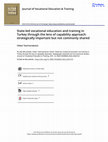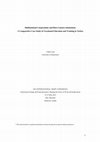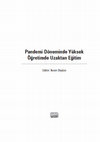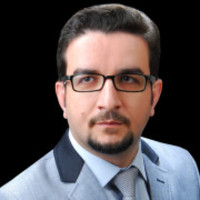Papers by Vildan Taşlı Karabulut

Building sustainable businesses from the inside out a deep dive into green HRM practices in leading Turkish companies, 2023
Environmental awareness and sustainability have become prominent concerns not only for countries ... more Environmental awareness and sustainability have become prominent concerns not only for countries but also for firms. As a result, companies are actively pursuing innovative strategies to integrate environmental
responsibility into their operations. This research focuses on the concept of Green Human Resource Management (GHRM) as a best practice to enhance sustainability and environmental stewardship within companies, all while ensuring profitability. The study highlights the growing ignificance of GHRM as a prevailing trend among Turkish companies. Specifically, it emphasizes the pivotal role of Human Resources (HR) departments in incorporating sustainability perspectives into management functions, thereby motivating employees to adopt sustainable behaviors. However, achieving this goal requires more than the efforts of the HR department alone; it also requires the backing of top management leadership to positively influence individual values and behaviors. Utilizing a qualitative research approach, this study analyses GHRM practices in six renowned Turkish companies celebrated for their dedication to sustainability, exploring their sustainable practices through their annual sustainability reports. Through the analysis of these reports, the researcher identifies instances of GHRM implementation. The paper provides concrete examples of how HR can drive sustainability, including the integration of sustainability principles into recruitment, training, and performance evaluation processes. Additionally, the study highlights the importance of collaboration between HR and top management leadership to encourage sustainable behaviors among employees. The insights gathered from these selected firms shed light on the pivotal role of HRM in fostering environmental responsibility. By analyzing their approaches, the study contributes to understanding how GHRM can enhance environmental stewardship in Turkiye, with potential to share best practices across diverse organizations.

Vocational education and training: A pathway for refugees' integration in the labour market? Lessons from Syrian refugees in Tarsus, Turkey, 2024
Vocational education and training (VET) has been promoted as a key strategy for refugees' integra... more Vocational education and training (VET) has been promoted as a key strategy for refugees' integration into the labour markets of their host societies, with the expectation that it would provide refugees the skills that are necessary to access better employment in their host countries. Nevertheless, evidence from both high‐income and middle‐income countries (MICs) shows that refugees predominantly work in labour‐intensive jobs under precarious conditions, and, VET has not always been an effective instrument to improve refugees' employment conditions. This article aims to understand the reasons behind this situation. It studies the multiplicity of factors influencing the viability of VET for refugees' labour market integration, focusing on Syrian refugees in Tarsus, Turkey, a MIC currently hosting the largest number of refugees worldwide. It shows that the top‐down, supply focused VET pro-grammes may have limited effectiveness in promoting better employment for refugees if the designers and implementers of these programmes do not fully consider the local context and the refugees' specific realities.

IGI Global eBooks, 2022
Drawing on enrichment theory, the study examines whether academics' experience in one dom... more Drawing on enrichment theory, the study examines whether academics' experience in one domain of work-life interface resulted in any enrichment in the other domain. The researcher conducted 26 semi-structured online interviews with academics from Turkey and the UK. Thematic analysis was utilized to identify themes and subthemes. The study shows that married people with young children (under 12) and especially female academics struggled the most to balance work and life during the pandemic because they had to fulfill their work and family responsibilities at the same time and place. Considering the research's findings from the enrichment model's perspective, it is concluded that remote work offers work and life enrichment to some extent to individuals, but individuals' diverse living circumstances matter in discussing work-life balance and the level of enrichment in work and life domains. This is important for organizations to put on their agenda while thriving to achieve diversity and develop inclusive workplaces in the post-COVID-19 era.

Taşlı Karabulut, V (2022). COVİD-19 Üniversiteleri öldürür mü? Pandemi sonrası dönemde üniversitelerin ve akademisyenlerin rollerinin yeniden tanımlanması. In Daştan, I. (ed.), Pandemi döneminde yüksek öğretimde uzaktan eğitim (pp.125-140). Nobel Akademik Yayincilik. , 2022
“Eğitim, gerçeklerin öğretilmesi değildir. Düşünmek için aklın eğitilmesidir.” Albert Einstein
... more “Eğitim, gerçeklerin öğretilmesi değildir. Düşünmek için aklın eğitilmesidir.” Albert Einstein
2016 yılında İngiltere’de katıldığım bir konferansta katılımcılar arasında iş dünyasından temsilciler de vardı. Google temsilcisi söz alıp, konferansa ev sahipliği yapan üniversitenin rektörünün gözlerinin içine bakarak ‘çok yakında üniversitelere ihtiyacımız kalmayacak; bireylerin, kurumların, şirketlerin ihtiyacı olan bilgiyi onlara biz doğrudan sunacağız’ demişti. Bu sözler, üniversitelerin varlık amacını, bilginin üreticisi ve temsilcisi olan bu kadim kurumların gelecekte hayatta kalıp kalmayacağını bana daha o zaman sorgulatmıştı. 4 yıl sonra COVID-19 hayatlarımızı ansızın değiştirdiğinde ve üniversiteler acil eylem planlarının bir parçası olarak uzaktan eğitim kararı aldıklarında aynı soru yeniden gündeme geldi: üniversiteler pandemi sonrası süreçte hayatta kalabilecekler mi?
Teknolojinin hızlı gelişimi, bilgiye erişimin kolaylaşması ve pandemiyle birlikte çevrimiçi eğitimin yaygınlaşmasının üniversitelerin araştırma ve eğitim faaliyetlerinde dönüştürücü bir etki oluşturması bekleniyor. Buradan yola çıkarak, mevcut çalışmanın çerçevesini oluşturan soru şu: COVID-19 pandemi süreci üniversitelerin ve akademisyenlerin rolünü nasıl etkiledi? Herkesin merak ettiği gibi, COVID-19 üniversitelerin yapısında değişimi tetikleyen bir dönüm noktası olacak mı? Bu konuda farklı görüşler mevcut; ancak baskın olan görüş, COVID-19’un yüksek öğrenimin yapısının gözden geçirilmesi, üniversitelerin ve akademisyenlerin rollerinde değişiklikler yapılması için bir fırsat penceresi oluşturduğu yönünde. Fakat, pandemi sonrası süreçte üniversitelerin ve akademisyenlerin rollerindeki değişimleri tartışmadan önce, üniversitelerin kurum olarak varoluş amaçları üzerine yeniden düşünmek gerekiyor.

Vocational education and training (VET) has been emphasised as an important topic in Turkey&#... more Vocational education and training (VET) has been emphasised as an important topic in Turkey's industrial development. However, Turkey's VET system has often been criticised for its weak performance in meeting employers' skill requirements and attracting successful students, which has resulted in the low status of VET in society. This article examines the Turkish VET system's ongoing challenges through the evaluation of different groups of stakeholders. Drawing on the Capability Approach, it seeks to understand stakeholders' role in improving individuals' capabilities in a state-led VET context. Focusing on the automotive industry, the researcher conducted 26 semi-structured interviews with the representatives of four groups: firms, industrial actors (industry chambers, employer associations, and trade unions), state agencies, and vocational teachers. The findings show that all stakeholders engaging with Turkey's state-driven VET system agree on the strategic importance of the system for Turkey's economic and social development. However, this agreement does not prove itself in the concerted action of the stakeholders to deal with the system's challenges.

Journal of Vocational Education and Training, 2022
Vocational education and training (VET) has been emphasised as an important topic in Turkey's ind... more Vocational education and training (VET) has been emphasised as an important topic in Turkey's industrial development. However, Turkey's VET system has often been criticised for its weak performance in meeting employers' skill requirements and attracting successful students, which has resulted in the low status of VET in society. This article examines the Turkish VET system's ongoing challenges through the evaluation of different groups of stakeholders. Drawing on the Capability Approach, it seeks to understand stakeholders' role in improving individuals' capabilities in a state-led VET context. Focusing on the automotive industry, the researcher conducted 26 semi-structured interviews with the representatives of four groups: firms, industrial actors (industry chambers, employer associations, and trade unions), state agencies, and vocational teachers. The findings show that all stakeholders engaging with Turkey's state-driven VET system agree on the strategic importance of the system for Turkey's economic and social development. However, this agreement does not prove itself in the concerted action of the stakeholders to deal with the system's challenges.
Multinational corporations as institutional entrepreneurs: the dynamic interplay between automobile firms and the Turkish VET system, 2020
This paper analyses the two-way relationship between multinational companies (MNCs) and Turkey’s ... more This paper analyses the two-way relationship between multinational companies (MNCs) and Turkey’s vocational education and training (VET) system through case studies of a Japanese and a German MNC in the automotive industry. Drawing on semi-structured interviews, it addresses the initiatives the MNCs have taken to guarantee skilled employees and their interaction with the Turkish VET system. The analysis shows how the MNCs have been ‘institutional entrepreneurs’ by introducing new practices. This was possible as the host environment has been open to change but also a requirement where strong industrial relations systems constituted an essential but missing home country institution.

National Skill Systems: A Comparative Analysis of Vocational Education and Training in Germany, Japan and Turkey, 2018
Having different institutional contexts (e.g. economy, society and culture), countries follow dif... more Having different institutional contexts (e.g. economy, society and culture), countries follow different skill regimes to prepare their people for the labour market. A rich body of literature examines the different characteristics of countries’ skill regimes. Drawing on the related literature, this paper introduces varieties of skill regimes in a classification of countries’ different approaches in shaping their skill systems. This is to capture the specifics of institutional variety that shapes differences in an economic organisation including skill development. The paper focuses on examining the characteristics of the vocational education and training (VET) systems in three countries: Germany, Japan, and Turkey. It compares the systems in these countries according to several themes including governance and financing of VET, skill specificity, and status of the VET system. The paper shows that three countries represent three different types of skill regimes. In Germany, VET performs in a consensus-led approach that entails coordination and cooperation of all social partners while shaping the VET system. Japan, on the other hand, has a firm-based VET system that depends on firms’ specific and different strategies in training and employing individuals. Despite sharing some similar characteristics with these two countries, Turkey is categorised as having a state-led VET system in which the state plays a dominant role in shaping the system.

Can We Still Talk About ‘Asian’ HRM Practices? An Exploratory Analysis of HRM Practices in Different Asian Countries, 2019
This is a study about HRM practices of Asian countries. Asian HRM has been of interest to researc... more This is a study about HRM practices of Asian countries. Asian HRM has been of interest to researchers. Several studies focused on different dimensions of HRM practices in different countries located in Asia. An important point to highlight while reviewing these studies is that the region of Asia should not be considered to be the sum of countries sharing same or similar characteristics. Every country has its own historical story and contextual settings. This suggests the necessity to consider different backgrounds of Asian countries in analysing HRM practices of these countries rather than assuming that they follow similar HRM trends. Aiming to understand in what aspects Asian countries’ HRM systems differ from each other and what the underpinning reasons are for these differences, the paper explores the traditional and changing pattern in HRM practices of China, Japan, Taiwan, Thailand, and Korea. It is seen that changing conditions (disruptive development in technology, economic reforms, Asian financial crisis, social and cultural elements of a national state) have a substantial influence on HRM practices of Asian countries and result in the transformation of these practices in time. Nevertheless, each country’s response to the macro changes has been different. Given this, the paper suggests that although countries may go through the same macro changes, rather than a convergence pattern in their HRM practices, countries preserve their nation-specific characteristics in shaping the HRM practices.

This paper discusses interaction of multinational corporations (MNCs) and host-country institutio... more This paper discusses interaction of multinational corporations (MNCs) and host-country institutions in shaping the Turkish vocational education and training (VET) system. The paper will focus on the Turkish VET system and three case studies - a German and Japanese MNC and a Turkish firm- operating in the automotive industry in Turkey. It will discuss how the firms engage with the system.
The paper consists of three main parts. The first part will introduce the current Turkish VET system by discussing the system’s framework and governance, as well as the system-related problems and the state’s responses to these problems. The second part will briefly present the relevant strand of literature on MNCs and host-country institutions, including factors influencing the relationship between MNCs and host country institutions. The third part will discuss the three case studies and discussion of preliminary findings on the firms’ engagement with the VET system. The paper will conclude with topics for further discussion.
Drafts by Vildan Taşlı Karabulut
1 Bu döküman, orijinal tezin özet çevirisidir ve bilgilendirme amacıyla kısa bir rapor şeklinde h... more 1 Bu döküman, orijinal tezin özet çevirisidir ve bilgilendirme amacıyla kısa bir rapor şeklinde hazırlanmıştır. Araştırmayla ilgili detaylı bilgi icin vildantasli@gmail.com adresinden iletişime geçebilirsiniz.
Books by Vildan Taşlı Karabulut

Pandemi döneminde yüksek öğretimde uzaktan eğitim, 2022
“Eğitim, gerçeklerin öğretilmesi değildir. Düşünmek için aklın eğitilmesidir.”
Albert Einstein
... more “Eğitim, gerçeklerin öğretilmesi değildir. Düşünmek için aklın eğitilmesidir.”
Albert Einstein
2016 yılında İngiltere’de katıldığım bir konferansta katılımcılar arasında iş dünyasından temsilciler de vardı. Google temsilcisi söz alıp, konferansa ev sahipliği yapan üniversitenin rektörünün gözlerinin içine bakarak ‘çok yakında üniversitelere ihtiyacımız kalmayacak; bireylerin, kurumların, şirketlerin ihtiyacı olan bilgiyi onlara biz doğrudan sunacağız’ demişti. Bu sözler, üniversitelerin varlık amacını, bilginin üreticisi ve temsilcisi olan bu kadim kurumların gelecekte hayatta kalıp kalmayacağını bana daha o zaman sorgulatmıştı. 4 yıl sonra COVID-19 hayatlarımızı ansızın değiştirdiğinde ve üniversiteler acil eylem planlarının bir parçası olarak uzaktan eğitim kararı aldıklarında aynı soru yeniden gündeme geldi: üniversiteler pandemi sonrası süreçte hayatta kalabilecekler mi?
Teknolojinin hızlı gelişimi, bilgiye erişimin kolaylaşması ve pandemiyle birlikte çevrimiçi eğitimin yaygınlaşmasının üniversitelerin araştırma ve eğitim faaliyetlerinde dönüştürücü bir etki oluşturması bekleniyor. Buradan yola çıkarak, mevcut çalışmanın çerçevesini oluşturan soru şu: COVID-19 pandemi süreci üniversitelerin ve akademisyenlerin rolünü nasıl etkiledi? Herkesin merak ettiği gibi, COVID-19 üniversitelerin yapısında değişimi tetikleyen bir dönüm noktası olacak mı? Bu konuda farklı görüşler mevcut; ancak baskın olan görüş, COVID-19’un yüksek öğrenimin yapısının gözden geçirilmesi, üniversitelerin ve akademisyenlerin rollerinde değişiklikler yapılması için bir fırsat penceresi oluşturduğu yönünde. Fakat, pandemi sonrası süreçte üniversitelerin ve akademisyenlerin rollerindeki değişimleri tartışmadan önce, üniversitelerin kurum olarak varoluş amaçları üzerine yeniden düşünmek gerekiyor.

Multidisciplinary Approach to Diversity and Inclusion in the COVID-19-Era Workplace, 2022
Drawing on enrichment theory, the study examines whether academics' experience in one domain of w... more Drawing on enrichment theory, the study examines whether academics' experience in one domain of work-life interface resulted in any enrichment in the other domain. The researcher conducted 26 semistructured online interviews with academics from Turkey and the UK. Thematic analysis was utilized to identify themes and subthemes. The study shows that married people with young children (under 12) and especially female academics struggled the most to balance work and life during the pandemic because they had to fulfill their work and family responsibilities at the same time and place. Considering the research's findings from the enrichment model's perspective, it is concluded that remote work offers work and life enrichment to some extent to individuals, but individuals' diverse living circumstances matter in discussing work-life balance and the level of enrichment in work and life domains. This is important for organizations to put on their agenda while thriving to achieve diversity and develop inclusive workplaces in the post-COVID-19 era.

Taşlı, V. (2019). ‘Multinational Companies' Skill Development Strategies in Developing Host Countries: A Comparative Case Study in Turkey’ in Aldemir, C. (ed.) The Concept of Development: An Interdisciplinary Approach. Gazi Kitapevi, pp. 73-92. , 2019
Vildan Tasli
MNCs’ skill development strategies in developing countries: A comparative case stud... more Vildan Tasli
MNCs’ skill development strategies in developing countries: A comparative case study in Turkey
Abstract
Purpose- This study aims to explore MNCs’ skill development strategies in a developing host country. With the decision of operating in a new country, MNCs also need to decide how to shape their skill policies for the labour force. This is also related to their engagement with the host country’s skill system. The skill system in this study mainly refers to vocational education and training (VET). The key question is that how MNCs influence the host country’s system in terms of development. The study aims to understand whether MNCs contribute to the development of the host country’s skill system. The focus hereby will be on the developing host countries, with the underlying assumption that they are going through the earlier stages of institutional development and therefore their skill systems need more revision and modification to achieve the required development level. The study’s main argument is that MNCs coming from developed countries and therefore presumably embedded in a context of developed skill systems tend to transfer their home countries’ skill practices to the developing host country.
Design/methodology/approach- The study adopted a comparative case-study approach in a Japanese and German MNC operating in the Turkish automotive industry. The aim was to understand to what extent these firms influence and contribute to the development of Turkey’s skill system. A total of 31 semi-structured interviews took place with HR managers, technical training specialists, vocational teachers, industry representatives, and actors of governance agencies.
Findings- The study shows that MNCs coming from different (developed) home countries adopt different approaches towards development of the host country’s skill system. The German firm examined in this study strongly engages with the skill system of Turkey. It has built a strong collaborative relationship with the VET actors to develop the system. Moreover, the firm follows a skill development strategy connected with the national VET system. The Japanese firm, on the other hand, have a predominantly headquarter-driven training and limited connection with the national system. The firm focuses on skill development of its labour force within the firm boundaries while supporting the VET system in Turkey through donation of technical materials.
Research limitations/implications- The study focused on MNCs’ influence on skill development of a host country and showed their different approaches leading to different level of influence on development of a host country’s skill system. Future studies may explore what factors determine MNCs’ different approaches. The scope of this study can be extended by including more MNCs from different home country backgrounds and industries to obtain a broader insight about MNCs’ influence on a host country’s skill system.
Key words: skill development, developing countries, and multinational countries.

Tasli, V. (2018). ‘Yönetişim Perspektifinde Çok Uluslu Şirketler ve Ev Sahibi Ülke Kurumları Arasındaki İlişki’ in Ucma-Uysal, T. and Kurt, G. (eds.) Disiplinlerarası Bakış Açısı İle Yönetişim. Gazi Kitapevi, pp. 155-180. , 2018
Çok uluslu şirketler ve ev sahibi ülkelerin etkisiyle (host-country effect) ilgili kapsamlı bir l... more Çok uluslu şirketler ve ev sahibi ülkelerin etkisiyle (host-country effect) ilgili kapsamlı bir literatür bulunmaktadır. Literatürdeki temel önermeler ve kurumsal teori çerçevesinde düşünüldüğünde, çok uluslu firmaların ev sahibi ülkelerde faaliyet gösterirken o ülkenin koşullarına uyum sağlamaları beklenir (Bkz. DiMaggio ve Powell, 1983; Scott, 2001). Ancak, bu araştırma, uluslararası firmaların, sadece bulunduğu ortama uyum sağlayan pasif aktörler olmanın ötesinde, ev sahibi ülkelerin kurumlarıyla karşılıklı etkileşime girerek kurumsal değişikliği tetikleyen aktörler olabileceğini öne sürmektedir. İlgili literatürde bulunan çalışmalar evsahibi ülke koşullarının çok uluslu firmaların uygulamaları üzerindeki etkisi ve firmaların da bu koşullara sağladığı uyum üzerinde durmaktadır (bkz. Bjorkman vd., 2007; Kostova vd., 2008). Fakat, bu uyum sürecinde çok uluslu firmaların evsahibi ülkenin kurumsal bağlamına etkisi ve katkısıyla ilgili birkaç çalışma (ör. Tempel ve Walgenbach, 2012) dışında pek fazla referansa rastlanmamıştır. Bu durum göz önüne alınarak, elimizdeki bu çalışma, yönetişim perspektifinden bir değerlendirme yaparak çok uluslu firmalar ve ev sahibi ülke kurumları arasındaki çift yönlü ilişkiye odaklanmaktadır.
Conference Presentations by Vildan Taşlı Karabulut

KOORDİNATÖR ÖĞRETMENLER: TÜRKİYE'DE MESLEKİ EĞİTİM SİSTEMİNİN KİLİT AKTÖRLERİ, 2019
İşletmelerde beceri eğitimi GİRİŞ Bu çalışma koordinatör öğretmenlerin (krd.öğretmen) Türkiye'nin... more İşletmelerde beceri eğitimi GİRİŞ Bu çalışma koordinatör öğretmenlerin (krd.öğretmen) Türkiye'nin mesleki eğitim sisteminde oynadığı rolü incelemektedir. Mesleki eğitim için okul ve sanayi arasında köprü konumunda olan krd.öğretmenler görevleri gereği sistem içindeki birçok aktörle doğrudan ya da dolaylı olarak etkileşimde bulunmaktadır. Bu açıdan bakıldığında, krd. öğretmenlerin diğer temel aktörlerle birlikte mesleki eğitim sisteminin merkezinde olduğu söylenebilir. Böyle önemli bir konumda bulunan krd.öğretmenlerin merkeziyetçi bir yaklaşımla yönetilen mesleki eğitim sisteminin şekillenmesinde nasıl bir etkisi olduğunu anlamak, sistemin geliştirilmesi sürecinde krd.öğretmenlerin önemli rolünün fark edilmesi açısından önemlidir. Ülkelerin endüstriyel kalkınmasında oldukça önemli bir yere sahip olan mesleki eğitim sisteminin çıktıları olarak görülen mesleki ve teknik beceriler 21.yy'da da işverenlerin ihtiyaç duydukları beceri grupları içinde en çok öne çıkardığı beceriler olmaya devam ediyor (WorldBank Group, 2015). Bu durum da küresel pazarda rekabet eden ülkeler için kendi mesleki ve teknik eğitim sistemlerini ivedilikle geliştirip sanayinin değişen ihtiyaçlarına göre yeniden şekillendirmeleri gerektiği anlamına geliyor. Sistemin dönüştürülmesi sürecinde hangi sosyal aktörlerin ne derece önemli rollere sahip olduğunu anlamak ve bu aktörlerin sürece aktif katılımını sağlamak mesleki eğitimde hedeflenen başarıyı yakalamak açısından gerekli bir adım olarak düşünülebilir. Bu çalışma, mesleki eğitimde rol oynayan sosyal aktörler (devlet, yerel yönetimden sorumlu aktörler, işveren, öğretmen, öğrenci, aile) içinde özellikle krd.öğretmenlerin rolüne odaklanmaktadır.









Uploads
Papers by Vildan Taşlı Karabulut
responsibility into their operations. This research focuses on the concept of Green Human Resource Management (GHRM) as a best practice to enhance sustainability and environmental stewardship within companies, all while ensuring profitability. The study highlights the growing ignificance of GHRM as a prevailing trend among Turkish companies. Specifically, it emphasizes the pivotal role of Human Resources (HR) departments in incorporating sustainability perspectives into management functions, thereby motivating employees to adopt sustainable behaviors. However, achieving this goal requires more than the efforts of the HR department alone; it also requires the backing of top management leadership to positively influence individual values and behaviors. Utilizing a qualitative research approach, this study analyses GHRM practices in six renowned Turkish companies celebrated for their dedication to sustainability, exploring their sustainable practices through their annual sustainability reports. Through the analysis of these reports, the researcher identifies instances of GHRM implementation. The paper provides concrete examples of how HR can drive sustainability, including the integration of sustainability principles into recruitment, training, and performance evaluation processes. Additionally, the study highlights the importance of collaboration between HR and top management leadership to encourage sustainable behaviors among employees. The insights gathered from these selected firms shed light on the pivotal role of HRM in fostering environmental responsibility. By analyzing their approaches, the study contributes to understanding how GHRM can enhance environmental stewardship in Turkiye, with potential to share best practices across diverse organizations.
2016 yılında İngiltere’de katıldığım bir konferansta katılımcılar arasında iş dünyasından temsilciler de vardı. Google temsilcisi söz alıp, konferansa ev sahipliği yapan üniversitenin rektörünün gözlerinin içine bakarak ‘çok yakında üniversitelere ihtiyacımız kalmayacak; bireylerin, kurumların, şirketlerin ihtiyacı olan bilgiyi onlara biz doğrudan sunacağız’ demişti. Bu sözler, üniversitelerin varlık amacını, bilginin üreticisi ve temsilcisi olan bu kadim kurumların gelecekte hayatta kalıp kalmayacağını bana daha o zaman sorgulatmıştı. 4 yıl sonra COVID-19 hayatlarımızı ansızın değiştirdiğinde ve üniversiteler acil eylem planlarının bir parçası olarak uzaktan eğitim kararı aldıklarında aynı soru yeniden gündeme geldi: üniversiteler pandemi sonrası süreçte hayatta kalabilecekler mi?
Teknolojinin hızlı gelişimi, bilgiye erişimin kolaylaşması ve pandemiyle birlikte çevrimiçi eğitimin yaygınlaşmasının üniversitelerin araştırma ve eğitim faaliyetlerinde dönüştürücü bir etki oluşturması bekleniyor. Buradan yola çıkarak, mevcut çalışmanın çerçevesini oluşturan soru şu: COVID-19 pandemi süreci üniversitelerin ve akademisyenlerin rolünü nasıl etkiledi? Herkesin merak ettiği gibi, COVID-19 üniversitelerin yapısında değişimi tetikleyen bir dönüm noktası olacak mı? Bu konuda farklı görüşler mevcut; ancak baskın olan görüş, COVID-19’un yüksek öğrenimin yapısının gözden geçirilmesi, üniversitelerin ve akademisyenlerin rollerinde değişiklikler yapılması için bir fırsat penceresi oluşturduğu yönünde. Fakat, pandemi sonrası süreçte üniversitelerin ve akademisyenlerin rollerindeki değişimleri tartışmadan önce, üniversitelerin kurum olarak varoluş amaçları üzerine yeniden düşünmek gerekiyor.
The paper consists of three main parts. The first part will introduce the current Turkish VET system by discussing the system’s framework and governance, as well as the system-related problems and the state’s responses to these problems. The second part will briefly present the relevant strand of literature on MNCs and host-country institutions, including factors influencing the relationship between MNCs and host country institutions. The third part will discuss the three case studies and discussion of preliminary findings on the firms’ engagement with the VET system. The paper will conclude with topics for further discussion.
Drafts by Vildan Taşlı Karabulut
Books by Vildan Taşlı Karabulut
Albert Einstein
2016 yılında İngiltere’de katıldığım bir konferansta katılımcılar arasında iş dünyasından temsilciler de vardı. Google temsilcisi söz alıp, konferansa ev sahipliği yapan üniversitenin rektörünün gözlerinin içine bakarak ‘çok yakında üniversitelere ihtiyacımız kalmayacak; bireylerin, kurumların, şirketlerin ihtiyacı olan bilgiyi onlara biz doğrudan sunacağız’ demişti. Bu sözler, üniversitelerin varlık amacını, bilginin üreticisi ve temsilcisi olan bu kadim kurumların gelecekte hayatta kalıp kalmayacağını bana daha o zaman sorgulatmıştı. 4 yıl sonra COVID-19 hayatlarımızı ansızın değiştirdiğinde ve üniversiteler acil eylem planlarının bir parçası olarak uzaktan eğitim kararı aldıklarında aynı soru yeniden gündeme geldi: üniversiteler pandemi sonrası süreçte hayatta kalabilecekler mi?
Teknolojinin hızlı gelişimi, bilgiye erişimin kolaylaşması ve pandemiyle birlikte çevrimiçi eğitimin yaygınlaşmasının üniversitelerin araştırma ve eğitim faaliyetlerinde dönüştürücü bir etki oluşturması bekleniyor. Buradan yola çıkarak, mevcut çalışmanın çerçevesini oluşturan soru şu: COVID-19 pandemi süreci üniversitelerin ve akademisyenlerin rolünü nasıl etkiledi? Herkesin merak ettiği gibi, COVID-19 üniversitelerin yapısında değişimi tetikleyen bir dönüm noktası olacak mı? Bu konuda farklı görüşler mevcut; ancak baskın olan görüş, COVID-19’un yüksek öğrenimin yapısının gözden geçirilmesi, üniversitelerin ve akademisyenlerin rollerinde değişiklikler yapılması için bir fırsat penceresi oluşturduğu yönünde. Fakat, pandemi sonrası süreçte üniversitelerin ve akademisyenlerin rollerindeki değişimleri tartışmadan önce, üniversitelerin kurum olarak varoluş amaçları üzerine yeniden düşünmek gerekiyor.
MNCs’ skill development strategies in developing countries: A comparative case study in Turkey
Abstract
Purpose- This study aims to explore MNCs’ skill development strategies in a developing host country. With the decision of operating in a new country, MNCs also need to decide how to shape their skill policies for the labour force. This is also related to their engagement with the host country’s skill system. The skill system in this study mainly refers to vocational education and training (VET). The key question is that how MNCs influence the host country’s system in terms of development. The study aims to understand whether MNCs contribute to the development of the host country’s skill system. The focus hereby will be on the developing host countries, with the underlying assumption that they are going through the earlier stages of institutional development and therefore their skill systems need more revision and modification to achieve the required development level. The study’s main argument is that MNCs coming from developed countries and therefore presumably embedded in a context of developed skill systems tend to transfer their home countries’ skill practices to the developing host country.
Design/methodology/approach- The study adopted a comparative case-study approach in a Japanese and German MNC operating in the Turkish automotive industry. The aim was to understand to what extent these firms influence and contribute to the development of Turkey’s skill system. A total of 31 semi-structured interviews took place with HR managers, technical training specialists, vocational teachers, industry representatives, and actors of governance agencies.
Findings- The study shows that MNCs coming from different (developed) home countries adopt different approaches towards development of the host country’s skill system. The German firm examined in this study strongly engages with the skill system of Turkey. It has built a strong collaborative relationship with the VET actors to develop the system. Moreover, the firm follows a skill development strategy connected with the national VET system. The Japanese firm, on the other hand, have a predominantly headquarter-driven training and limited connection with the national system. The firm focuses on skill development of its labour force within the firm boundaries while supporting the VET system in Turkey through donation of technical materials.
Research limitations/implications- The study focused on MNCs’ influence on skill development of a host country and showed their different approaches leading to different level of influence on development of a host country’s skill system. Future studies may explore what factors determine MNCs’ different approaches. The scope of this study can be extended by including more MNCs from different home country backgrounds and industries to obtain a broader insight about MNCs’ influence on a host country’s skill system.
Key words: skill development, developing countries, and multinational countries.
Conference Presentations by Vildan Taşlı Karabulut
responsibility into their operations. This research focuses on the concept of Green Human Resource Management (GHRM) as a best practice to enhance sustainability and environmental stewardship within companies, all while ensuring profitability. The study highlights the growing ignificance of GHRM as a prevailing trend among Turkish companies. Specifically, it emphasizes the pivotal role of Human Resources (HR) departments in incorporating sustainability perspectives into management functions, thereby motivating employees to adopt sustainable behaviors. However, achieving this goal requires more than the efforts of the HR department alone; it also requires the backing of top management leadership to positively influence individual values and behaviors. Utilizing a qualitative research approach, this study analyses GHRM practices in six renowned Turkish companies celebrated for their dedication to sustainability, exploring their sustainable practices through their annual sustainability reports. Through the analysis of these reports, the researcher identifies instances of GHRM implementation. The paper provides concrete examples of how HR can drive sustainability, including the integration of sustainability principles into recruitment, training, and performance evaluation processes. Additionally, the study highlights the importance of collaboration between HR and top management leadership to encourage sustainable behaviors among employees. The insights gathered from these selected firms shed light on the pivotal role of HRM in fostering environmental responsibility. By analyzing their approaches, the study contributes to understanding how GHRM can enhance environmental stewardship in Turkiye, with potential to share best practices across diverse organizations.
2016 yılında İngiltere’de katıldığım bir konferansta katılımcılar arasında iş dünyasından temsilciler de vardı. Google temsilcisi söz alıp, konferansa ev sahipliği yapan üniversitenin rektörünün gözlerinin içine bakarak ‘çok yakında üniversitelere ihtiyacımız kalmayacak; bireylerin, kurumların, şirketlerin ihtiyacı olan bilgiyi onlara biz doğrudan sunacağız’ demişti. Bu sözler, üniversitelerin varlık amacını, bilginin üreticisi ve temsilcisi olan bu kadim kurumların gelecekte hayatta kalıp kalmayacağını bana daha o zaman sorgulatmıştı. 4 yıl sonra COVID-19 hayatlarımızı ansızın değiştirdiğinde ve üniversiteler acil eylem planlarının bir parçası olarak uzaktan eğitim kararı aldıklarında aynı soru yeniden gündeme geldi: üniversiteler pandemi sonrası süreçte hayatta kalabilecekler mi?
Teknolojinin hızlı gelişimi, bilgiye erişimin kolaylaşması ve pandemiyle birlikte çevrimiçi eğitimin yaygınlaşmasının üniversitelerin araştırma ve eğitim faaliyetlerinde dönüştürücü bir etki oluşturması bekleniyor. Buradan yola çıkarak, mevcut çalışmanın çerçevesini oluşturan soru şu: COVID-19 pandemi süreci üniversitelerin ve akademisyenlerin rolünü nasıl etkiledi? Herkesin merak ettiği gibi, COVID-19 üniversitelerin yapısında değişimi tetikleyen bir dönüm noktası olacak mı? Bu konuda farklı görüşler mevcut; ancak baskın olan görüş, COVID-19’un yüksek öğrenimin yapısının gözden geçirilmesi, üniversitelerin ve akademisyenlerin rollerinde değişiklikler yapılması için bir fırsat penceresi oluşturduğu yönünde. Fakat, pandemi sonrası süreçte üniversitelerin ve akademisyenlerin rollerindeki değişimleri tartışmadan önce, üniversitelerin kurum olarak varoluş amaçları üzerine yeniden düşünmek gerekiyor.
The paper consists of three main parts. The first part will introduce the current Turkish VET system by discussing the system’s framework and governance, as well as the system-related problems and the state’s responses to these problems. The second part will briefly present the relevant strand of literature on MNCs and host-country institutions, including factors influencing the relationship between MNCs and host country institutions. The third part will discuss the three case studies and discussion of preliminary findings on the firms’ engagement with the VET system. The paper will conclude with topics for further discussion.
Albert Einstein
2016 yılında İngiltere’de katıldığım bir konferansta katılımcılar arasında iş dünyasından temsilciler de vardı. Google temsilcisi söz alıp, konferansa ev sahipliği yapan üniversitenin rektörünün gözlerinin içine bakarak ‘çok yakında üniversitelere ihtiyacımız kalmayacak; bireylerin, kurumların, şirketlerin ihtiyacı olan bilgiyi onlara biz doğrudan sunacağız’ demişti. Bu sözler, üniversitelerin varlık amacını, bilginin üreticisi ve temsilcisi olan bu kadim kurumların gelecekte hayatta kalıp kalmayacağını bana daha o zaman sorgulatmıştı. 4 yıl sonra COVID-19 hayatlarımızı ansızın değiştirdiğinde ve üniversiteler acil eylem planlarının bir parçası olarak uzaktan eğitim kararı aldıklarında aynı soru yeniden gündeme geldi: üniversiteler pandemi sonrası süreçte hayatta kalabilecekler mi?
Teknolojinin hızlı gelişimi, bilgiye erişimin kolaylaşması ve pandemiyle birlikte çevrimiçi eğitimin yaygınlaşmasının üniversitelerin araştırma ve eğitim faaliyetlerinde dönüştürücü bir etki oluşturması bekleniyor. Buradan yola çıkarak, mevcut çalışmanın çerçevesini oluşturan soru şu: COVID-19 pandemi süreci üniversitelerin ve akademisyenlerin rolünü nasıl etkiledi? Herkesin merak ettiği gibi, COVID-19 üniversitelerin yapısında değişimi tetikleyen bir dönüm noktası olacak mı? Bu konuda farklı görüşler mevcut; ancak baskın olan görüş, COVID-19’un yüksek öğrenimin yapısının gözden geçirilmesi, üniversitelerin ve akademisyenlerin rollerinde değişiklikler yapılması için bir fırsat penceresi oluşturduğu yönünde. Fakat, pandemi sonrası süreçte üniversitelerin ve akademisyenlerin rollerindeki değişimleri tartışmadan önce, üniversitelerin kurum olarak varoluş amaçları üzerine yeniden düşünmek gerekiyor.
MNCs’ skill development strategies in developing countries: A comparative case study in Turkey
Abstract
Purpose- This study aims to explore MNCs’ skill development strategies in a developing host country. With the decision of operating in a new country, MNCs also need to decide how to shape their skill policies for the labour force. This is also related to their engagement with the host country’s skill system. The skill system in this study mainly refers to vocational education and training (VET). The key question is that how MNCs influence the host country’s system in terms of development. The study aims to understand whether MNCs contribute to the development of the host country’s skill system. The focus hereby will be on the developing host countries, with the underlying assumption that they are going through the earlier stages of institutional development and therefore their skill systems need more revision and modification to achieve the required development level. The study’s main argument is that MNCs coming from developed countries and therefore presumably embedded in a context of developed skill systems tend to transfer their home countries’ skill practices to the developing host country.
Design/methodology/approach- The study adopted a comparative case-study approach in a Japanese and German MNC operating in the Turkish automotive industry. The aim was to understand to what extent these firms influence and contribute to the development of Turkey’s skill system. A total of 31 semi-structured interviews took place with HR managers, technical training specialists, vocational teachers, industry representatives, and actors of governance agencies.
Findings- The study shows that MNCs coming from different (developed) home countries adopt different approaches towards development of the host country’s skill system. The German firm examined in this study strongly engages with the skill system of Turkey. It has built a strong collaborative relationship with the VET actors to develop the system. Moreover, the firm follows a skill development strategy connected with the national VET system. The Japanese firm, on the other hand, have a predominantly headquarter-driven training and limited connection with the national system. The firm focuses on skill development of its labour force within the firm boundaries while supporting the VET system in Turkey through donation of technical materials.
Research limitations/implications- The study focused on MNCs’ influence on skill development of a host country and showed their different approaches leading to different level of influence on development of a host country’s skill system. Future studies may explore what factors determine MNCs’ different approaches. The scope of this study can be extended by including more MNCs from different home country backgrounds and industries to obtain a broader insight about MNCs’ influence on a host country’s skill system.
Key words: skill development, developing countries, and multinational countries.